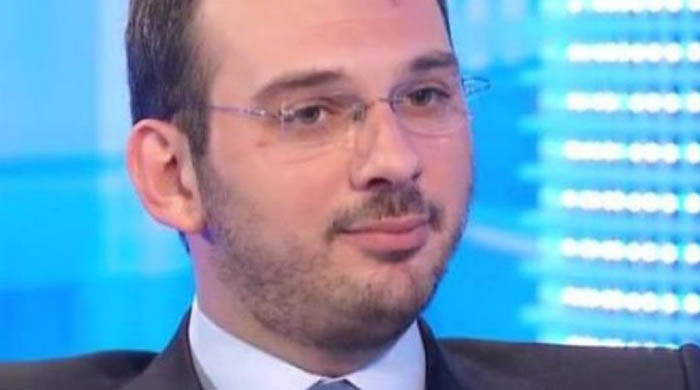[vc_row][vc_column][vc_column_text]

Italian journalist Paolo Borrometi.
Italian journalist Paolo Borrometi was forced to move to Rome from Sicily because of threats he was receiving connected with his reporting on organised crime. Borrometi’s story is far from unique. He is one of the 20 journalists currently under police escort in Italy.
In May 2014, Borrometi was beaten by two hooded men near his home after he asked citizens to report any relevant information to investigators about a two-year-old murder. The assault did not deter his reporting on organised crime, nor did a vandalism incident in which the front door of his parent’s home was destroyed in an arson attack.
Despite being forced to relocate to Rome for security reasons, Borrometi’s work uncovering mafia activities continued, as did the almost constant intimidation he faced. This summer a group of unidentified people raided his home, stealing computer hard disks and a series of documents related to his investigations.
The Italian Interior Ministry released official figures of the number of journalists under police protection for the first time in June 2017 to highlight the growing phenomenon.
Borrometi works as editor-in-chief of a local webzine, LaSpia.it, and is a contributor to several other media outlets as a freelancer. Without a regular salary, he needs to keep publishing to earn a living. Many Italian journalists are in the same position financially. According to Nicola Marini, a board member of the Association of Journalists (Ordine dei Giornalisti), which monitors the ethical conduct of journalists, eight out of ten Italian journalists earn less than €10,000 per year.
Beppe Giulietti, the president of the Italian journalists’ trade union FNSI, recounted a conversation he had with Borrometi after the interior ministry decided to put him under escort: “He was worried this situation could interfere with his job.” For freelance reporters a mafia threat does not just affect personal safety, it creates a serious obstacle to performing their jobs. Conducting a simple interview becomes a lot harder when the reporter is followed by a group of policemen. But without them, Borrometi’s life would be in serious danger.
“Compared to the past, the current situation for journalists shows fewer mafia killings,” Giulietti told Index on Censorship. “But sometimes physical threats are not necessary.”
Indeed the economic situation for Italian journalists is harsh and, as Giulietti said, “a defamation lawsuit could be as lethal as a bullet”. Many journalists stop working on investigations because of the risk of lawsuits. If they were sued they wouldn’t be able to afford the economic risks. The result is self-censorship.
Many lawsuits have no legal basis. The Italian permanent observatory on threats to journalists, Ossigeno, estimates that one-third of defamation claims in Italy originate from allegedly mafia-connected people or lobbies.
These cases are often civil and the plaintiff demands enormous amounts of money even though the claim is created as a pretext and the alleged damage is minimal. Quite often the aim is only to intimidate.
The financial fragility of journalists has led to a phenomenon that Alberto Spampinato, president of Ossigeno, calls “the Italian paradox”. Italy has a long history of journalists killed by mafia-affiliated killers, especially during the late 1980s and 1990s. This situation brings growing attention to the link between freedom of information and organised crime.
After an initially strong reaction from the public, things usually turn silent. Ossigeno, which was founded in 2007 after three journalists and writers – Roberto Saviano, Lirio Abbate and Rosaria Capacchione – were put under police escort, aims to put a continuous spotlight on threats to journalists. The Italian public is aware of the problem but politicians are not reactive, according to both Spampinato and Giulietti. Freedom of information, especially related to the nexus between organised crime, politics and corruption is constantly under siege.
The Italian parliament is currently discussing a new law to avoid the complete transcriptions of the intercepted conversations, “but no one is taking care of the lawsuits based on weak grounds which are only made to intimidate journalists (in Italian defined as “querela temeraria”), although the trade union has already highlighted this problem,” Giulietti said. The president of the journalists’ trade union wants to stress how politicians are focused only in amending the system not to publish news that could affect them, rather than amending a concrete vulnus in freedom of journalists.
According to the latest Ossigeno report, reporting on organised crime is harder for people who live in remote places. Local journalists often feel pressure from local officials and criminal syndicated, Spampinato explained.
For example, in Rho, a small town in the outskirts of Milan, the newsroom of the local newspaper, Settegiorni, was vandalised by a group of unknown people three times in three months, the latest incident occurring on 3 September. The newspaper has been working on an investigation about the presence of the criminal syndicate ‘Ndrangheta in Rho, according to editor-in-chief Angelo Baiguini.
Though politicians are slow to act, some parts of the Italian parliament are monitoring the situation. The Parliamentary Anti-Mafia Commission set up a Committee on Mafia, Journalism and Media. In August 2015 the Committee highlighted that there are southern Italian regions where media publishers have an “opaque management”, involved in judiciary case, even for alleged external support to mafia syndications. Obviously they are willing to stop muckrakers digging into their businesses.
Up until now, there have been no solutions to this problem from a legal perspective. This leaves many good reporters at risk and makes in-depth reporting about organised crime ever more difficult. [/vc_column_text][/vc_column][/vc_row][vc_row][vc_column][vc_basic_grid post_type=”post” max_items=”4″ element_width=”6″ grid_id=”vc_gid:1505821805138-929619f7-ec4b-9″ taxonomies=”193, 6564″][/vc_column][/vc_row]




